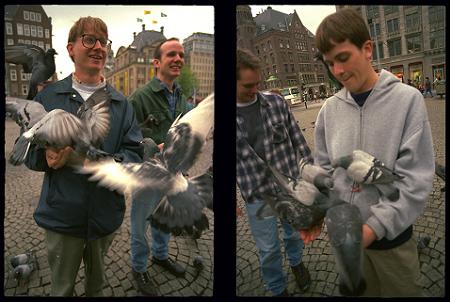
On 12/31/00, dropped-D alt-rockers Hum played their final show in Chicago, appearing with the Flaming Lips at the Metro. Now, eight years to the date, the group reconvenes in the Windy City for a double dose of reunion performances.
ALARM intercepts transmissions from Hum singer Matt Talbott and bassist Jeff Dimpsey before these impending shows, the first of which is tonight at Chicago’s Double Door.
The Champaign-Urbana, IL quartet, known widely for its 1995 hit, “Stars,” wrote what local illustrator and Dianogah bassist Jay Ryan called “enormous songs about astronauts, whales, and girls.”
It released four accessible yet feedback-and-metal-suffused records from 1991-1998. Its major label debut, You’d Prefer An Astronaut, the one with “Stars” on it, sold over 250,000 copies in a few months.
Hum’s last Chicago show was at the Metro on New Year’s Eve in 2000. Since officially disbanding, the group has played a spate of shows, mostly in Champaign, but its members’ busy professional and family lives — as well as their separate musical projects (Centaur, Gazelle) — have made a Chicago return impossible.
This year they’ve decided to make it work. For a band with such intense, intricately arranged songs, its members are surprisingly casual about all things Hum. “It’s not personally important for me [to play again with Hum],” says singer Matt Talbott. “It just sounded like fun.”
We caught up with Talbott and bassist Jeff Dimpsey over the course of two weeks in early December.
Matt, how easy or difficult has it been to access the feelings behind the Hum lyrics you wrote so many years ago?
Talbott: I think one of the most difficult aspects of doing a show like this is rediscovering meaning in songs you wrote a long time ago, when you were perhaps a slightly different person.
The audience can’t have a legitimate emotional experience if you’re not having one, you know? Otherwise you might as well be putting your energy into a Foghat tribute band working the county fair circuit. Which, now that I think about it, actually sounds kinda cool. Maybe that’s a bad example.
I’ve found it easier than I expected to access the original intent of my lyrics, and, in some cases, I find the same lyrics articulating new ideas, offering new interpretations of experiences I’ve had in the many interim years since I wrote them.
It’s probably only possible because most of my stuff walks that fine line between impressionism and pure mountain gibberish.
How did Chicago’s music scene influence Hum while you were writing records?
Dimpsey: I don’t think that the Chicago scene influenced us, though who knows — all experiences are folded back into oneself. We played a lot of shows in Chicago, and with bands from Chicago, and Electra 2000 was recorded at Idful Studios. But if there was a musical scene from a larger town that we felt a kinship with, it was probably the scene in Kansas City at that time.
What about Kansas City did you connect with?
Talbott: There are more dirt bags out there. It’s an evil place. We just seemed to fit in better and were always made to feel very welcome.
Ian Mackaye recently said that music shouldn’t be your job. You should get a job and then make music because you need to. What’s your reaction to Ian’s comment?
Dimpsey: I suspect that this is a common thought, that there’s a purity to creating art, and that any sort of compensation involved, especially the monetary kind, somehow must taint the output for the worse. I’m not sure that I agree.
I’m glad that many musicians can and have concentrated on their musical output fully without the distraction of a non-musical job. Artists such as Pink Floyd, Miles Davis, Brian Eno, Willie Nelson and many, many more. I assume that these artists make music because they need to. I think that the world would be a much less rich place if artists like these were trying to write and record on evenings and weekends.
Continue reading Jarrett Dapier’s interview with Hum.

Long. Live. Hum.
Hello. And Bye. 🙂
May 22nd 2010, Old Rock House, St Louis!!!!